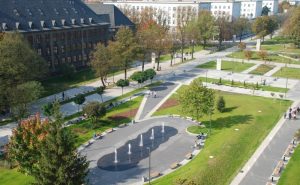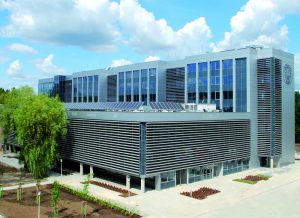Silesian University of Technology (SUT)


The Silesian University of Technology (SUT) was established in 1945 as the scientific and teaching centre of Upper Silesia, the most industrialised region in Poland and one of the most industrialised in Europe. It is the oldest technical university in the region and one of the largest nationwide.
In its 70-years-long history, it remained and still remains a relevant public life institution, playing a crucial cultural and opinion-forming function in the region.
The main seat of the university is located in Gliwice, but it also educates students in Katowice and Zabrze. Over 60 study programmes and over 200 specializations related to a vast range of engineering studies are offered in 15 faculties, including one college and research institute. Currently over 21 thousand students study at our university, including over 15 thousand on full-time study programmes. The institution offers first degree studies – Bachelor of Engineering, second degree – master studies, and third degree – doctoral, all available for either full-time or part-time study.


An important aspect that contributes to the creation of our programmes and new study majors is the economic environment of the university. A direct effect of the collaboration with the industry is, among other things, dual studies, where students simultaneously gain academic knowledge and professional experience, which results in educating highly qualified employees for modern industry.
The Silesian University of Technology educates not only future engineers. It also offers such majors as administration and sociology, as well as pedagogy and philology. The University also offers free full-time studies in English via 11 study programmes. This provides a perfect opportunity for those who, in the future, plan to work abroad or in international companies. With such a wide range of studies offered at our university, everybody will find a major most suitable for them.
Graduates of the Silesian University of Technology often work in managerial and executive positions in industrial corporations, which can be seen in numerous rankings conducted by independent research facilities. A report issued by Sedlak & Sedlak shows that 1 in 12 chairmen in Poland graduated from SUT. Also, according to the “Rzeczpospolita” journal, our university is 4th in the country, in terms of educating successful people.
A rich didactic offering and the high quality of education contribute to the fact that the Silesian University of Technology is one of the leading technical universities in Poland, which can be proven by high positions in the rankings of higher education institutions. Our University ranked 4th in Poland in the recent Ranking of Engineering Studies and 5th in the Ranking of Technical Universities in Poland, both issued by the “Perspektywy” Education Foundation. It is also the best university in the Silesian Voivodeship.
The Silesian University of Technology, as a prestigious European technical university, also conducts innovative scientific research and developmental work, educates highly qualified staff for society and industry, as well as actively influencing the development of regional and local communities. Thanks to constant improvements in processes and organisation, SUT is a friendly and open place for work and development of the academic community. It is here, where new ideas and solutions are born, allowing for the implementation of multilateral scientific cooperation in numerous relevant fields of study, as well as making our university an active player in terms of innovation and new technologies, which is necessary in a knowledge-based economy.
Politechnika Śląska, Silesian University of Technology (SUT) in Poland is represented in the INDIRES project by the Faculty of Electrical Engineering and the Faculty of Mechanical Engineering.
Faculty of Electrical Engineering
The Faculty of Electrical Engineering of the Silesian University of Technology was formally established by the decree of May 24, 1945. Over the years, the organisational structure of the Faculty has changed numerous times. In 1994, the Faculty launched PhD studies for the first time. Since the very beginning, the Faculty of Electrical Engineering has offered full-time and part-time courses in Electrical Engineering. Following the changing market requirements and expectations of employers, a course in Electronics and Telecommunications was launched in 1995 and, in 2008, two new courses, Computer Science and Mechatronics, were introduced. In 2013 a new course – Power Engineering, with the unique specialisation of Prosumer Power Engineering was launched.
Nowadays the Faculty of Electrical Engineering is divided into six units: two institutes and four departments. The number of academic staff employed by the Faculty of Electrical Engineering is 110 including 25 professors and associate professors.
Research activities of the Faculty of Electrical Engineering mainly concern electrical engineering, electronics, telecommunications, power engineering, computer science, mechatronics and optics. There are over 40 laboratories at the Faculty, equipped with modern electric, electronic, computer and telecommunication instruments and devices. The Faculty of Electrical Engineering cooperates with over 60 foreign universities all around the world.
The Faculty of Electrical Engineering has close cooperation with almost 100 Polish and foreign industrial companies, representing every speciality connected with electrical engineering: electronics, power engineering, telecommunications, optoelectronics, robotics, computer and measurement science and electrical engineering in transport.
Faculty of Mechanical Engineering
The Faculty of Mechanics was established along with the Silesian University of Technology with the decree dated 24th May 1945. The first inauguration of the academic year of the Silesian University of Technology, in Gliwice, was held on 29th October 1945, in the University’s only teaching building, belonging, currently, to the Faculty of Chemical Engineering.
The Faculty of Mechanical Engineering has developed industry collaboration over many years in the fields of industrial automation and robotics, machine building, and materials engineering, as well as with the industrial, scientific and research centres. Implemented is unique in the country-scale programme of cooperation and inclusion of industry in the implementation of the educational process. This is one of the factors stimulating the development of the laboratory and teaching base of the Faculty. These activities allow students access to the latest technologies and equipment used in industrial production, including globally renowned companies, and the Faculty offers the possibility of practical verification of theoretical knowledge and conducts interesting research. The Faculty offers specialisations for 2nd level studies in cooperation with, and under the patronage of, leading domestic and international companies in the field of advanced technology.
Cooperation with industry includes:
- carrying out scientific and research projects,
- providing expertise and research in scientific laboratories,
- transfer of modern technology, from science to the industrial sphere,
- participation of economic operators in equipping teaching and research laboratories of the Faculty
- organisation of internships and production practices for students, PhD students and the Faculty staff,
- organisation of postgraduate studies for candidates who want to improve their professional credentials,
- organisation of specialist courses.
A three-level system of studies is carried out as studies with the general academic profile:
- 1st level (Eng level) for candidates with the certificate of matriculation,
- 2nd level (Master of Science) for candidates with the professional degree of Engineer in the particular branch of science or any related branches,
- 3rd level (PhD student) for the most talented graduates of the 2nd level studies.
Full-time studies of the 1st and 2nd levels are offered in the following fields:
- automation and robotics,
- applied computer science with computer materials science,
- materials Engineering,
- Mechanics and machine design,
- mechatronics,
- nanotechnology and materials processing technologies,
- management and production engineering.

